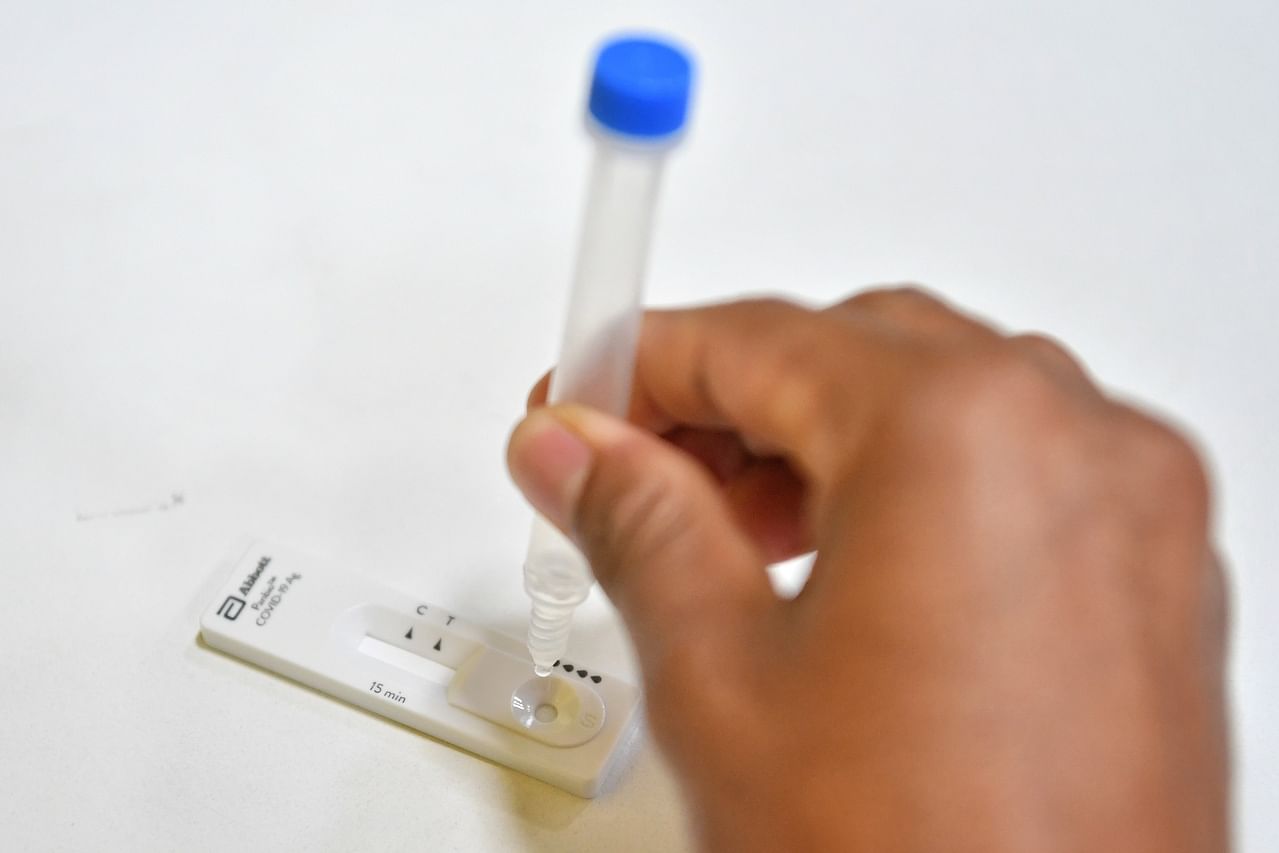Why Covid-19 self-testing is not the norm for some S'poreans
Sign up now: Get ST's newsletters delivered to your inbox

In Singapore, the prices of the self-test kits range between $8 and $13 each.
PHOTO: ST FILE
Jolene Ang, Wallace Woon
Follow topic:
SINGAPORE - When chef Sameer Chablani, 37, goes to visit his parents - who are in their late 60s - he conducts an antigen rapid test (ART) on himself, waiting for a negative test result before he makes the weekly trip to their home.
Mr Chablani, who is fully vaccinated, said he tests himself at least once a week as the high number of Covid-19 cases reported daily means that getting the virus may be inevitable.
He said: "When we're with family, we remove our masks. And if I can help protect them (his parents), then why not perform a regular test to make sure that I don't have the virus?"
He added that the regular testing regime for someone working in the food and beverage industry has made self-testing more of a habit, making the hassle an easier one to deal with when he factors in the potential guilt of infecting his parents as well.
But Mr Chablani seems to be an exception.
The Straits Times spoke to a number of Singaporeans, many of whom said they have conducted ARTs on themselves only when they are required to for work or for medical reasons.
The Government had distributed six kits to each household from August to September, and is currently distributing another 10 kits from October to December.
Individuals who need more kits have been advised to buy them from major retailers and e-commerce platforms.
Retailers told ST that demand for ART kits has been mostly steady, with sufficient stock in storage and more expected to arrive in the coming weeks.
The Guardian pharmacy chain said it expects a slight increase in demand following the gradual reopening announced by the Government, while a spokesman for FairPrice, which manages the Unity pharmacies, said demand has been rising in the past three months.
Stressing that Guardian has sufficient stock of ART kits, its spokesman urged customers to "shop safely and purchase only what they need".
Watsons said its sale of ART kits is stabilising. "We are monitoring the situation closely and have sufficient stock in the warehouse to meet the market's demand," it added.
Across the Causeway, more Malaysians are self-testing without being asked to, such as before attending get-togethers, ST reported on Thursday (Nov 11).
This comes as the country prepares its people for an endemic phase, where Malaysians live with the virus and exercise self-responsibility.
When asked about the difference in behaviour, experts said that one reason Singaporeans do not regularly self-test could be that ART kits here are "affordable but not cheap".
In Singapore, the prices of the self-test kits range between $8 and $13 each, with the price per kit lower for larger packs.
Over in Malaysia, in a bid to encourage regular self-testing, the government had gradually reduced the prices of test kits to make them more affordable for the public.
The test kits there are available for as low as RM6.90 (S$2.24) a unit and are sold at supermarkets, convenience stores and petrol stations across Malaysia.
Associate Professor Alex Cook, vice-dean of research at the Saw Swee Hock School of Public Health at the National University of Singapore, said: "You could get one or two meals in a hawker centre for (the price of one ART kit), so it's affordable but not cheap, and it's not surprising that most people don't routinely test themselves whenever they are going to socialise with others."
Public health guidelines could also have given the impression that testing should be done only when necessary, Prof Cook added.
"Because we've outlined the situations in which testing must be done - if (one is) a contact of a case, at work or school, before mass events, when taking a cruise to sea and back again - it may have created the impression that testing should be done then and should not be done at other times."
Health Minister Ong Ye Kung had addressed concerns in Parliament earlier this month on the supply and price of ART kits.
In written replies to a number of related questions, Mr Ong said: "Both the Ministry of Health (MOH) and commercial retailers are already buying in bulk to replenish our stock and supply their stores respectively."
MOH has sourced and approved affordable and effective kits, held one round of distribution of free kits to all households, and is doing a second round, he added.
He pointed out that individuals who receive a health risk warning can collect an extra six free kits from 200 vending machines around the island, while workers on mandatory regular testing regimes are provided free kits by the Government.
"We also monitor the overall supply levels and are prepared to release government stock to retailers when there are shortages," Mr Ong added.
Ms Rachel Koh, 33, recalled having to spend "a couple of hundred dollars" on ART kits when her 71-year-old father, a security officer, tested positive for Covid-19 in October.
"We didn't receive any SMS, so we couldn't redeem the free ones (for those with a health risk warning)," said the adjunct lecturer at Lasalle College of the Arts, who lives with her father and 67-year-old mother, an administrative assistant.
All three of them are fully vaccinated.
Now, Ms Koh tries to administer a self-test once a week or more if she has been in an indoor crowded place such as a restaurant for an extended period of time.
"I want to avoid getting infected with Covid-19 from my parents or passing it to them. We can't afford the downtime of recovery as we might lose income."

